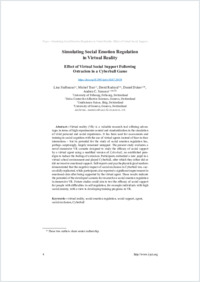Simulating Social Emotion Regulation in Virtual Reality: Effect of Virtual Social Support Following Ostracism in a Cyberball Game
IPC
- Stallmann, Lina ORCID University of Fribourg, Fribourg, Switzerland; Swiss Center for Affective Sciences, Geneva, Switzerland
- Tran, Michel University of Fribourg, Fribourg, Switzerland; Unidistance Suisse, Brig, Switzerland
- Rudrauf, David ORCID Swiss Center for Affective Sciences, Geneva, Switzerland; University of Geneva, Geneva, Switzerland
- Dukes, Daniel ORCID University of Fribourg, Fribourg, Switzerland; Swiss Center for Affective Sciences, Geneva, Switzerland
- Samson, Andrea C. ORCID University of Fribourg, Fribourg, Switzerland; Swiss Center for Affective Sciences, Geneva, Switzerland; Unidistance Suisse, Brig, Switzerland
- 05.04.2023
Published in:
- International Journal of Emerging Technologies in Learning (iJET). - International Association of Online Engineering (IAOE). - 2023, vol. 18, no. 07, p. 4-27
English
Virtual reality (VR) is a valuable research tool offering advantages in terms of high experimenter control and standardization in the simulation of vivid personal and social experiences. It has been used for assessments and training in social cognition with the use of virtual agents instead of face-to-face interactions – but its potential for the study of social emotion regulation has, perhaps surprisingly, largely remained untapped. The present study evaluates a novel immersive VR scenario designed to study the efficacy of social support by a virtual agent using a modified version of Cyberball, an established paradigm to induce the feeling of ostracism. Participants embodied a new pupil in a virtual school environment and played Cyberball, after which they either did or did not receive emotional support. Self-reports and psychophysiological markers demonstrated that the negative impact of social exclusion in Cyberball was successfully replicated, while participants also reported a significant improvement in emotional state after being supported by the virtual agent. These results indicate the potential of the developed scenario for research on social emotion regulation
in immersive VR. Future studies could aim to test the efficacy of social support for people with difficulties in self-regulation, for example individuals with high social anxiety, with a view to developing training programs in VR.
in immersive VR. Future studies could aim to test the efficacy of social support for people with difficulties in self-regulation, for example individuals with high social anxiety, with a view to developing training programs in VR.
- Faculty
- Faculté des lettres et des sciences humaines
- Department
- Département de Pédagogie spécialisée
- Language
-
- English
- License
- Open access status
- gold
- Identifiers
-
- DOI 10.3991/ijet.v18i07.29419
- ISSN 1863-0383
- Persistent URL
- https://folia.unifr.ch/unifr/documents/324779
Statistics
Document views: 342
File downloads:
- 4_simulatingsocialemotionregulationinvirtualreality: 297
